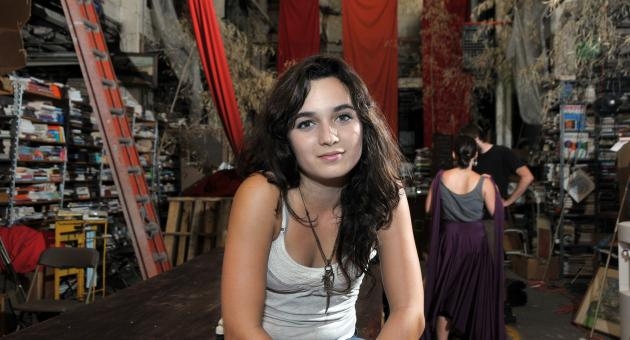Temple students and alumni experiment at theater’s fringe

Sara Howard sits along a row of colorful books lining the walls of the Philadelphia Book Company, a Fishtown factory turned book store. It’s rehearsal time, and Howard, a Temple undergraduate and one of the founding members of the Found Theater Company, is busy preparing her part.
A collaboration between about a dozen Temple students and recent graduates of the university’s Theater Department, the Found Theater creates experimental and improvisational theater using minimal set design, music and costuming.
The ensemble began to take shape after a group of Temple theater students produced a show called Something with Wings, a play based on Fredrick Nietzsche’s ideas about the death of God, for last year’s Philadelphia Fringe Festival.
“We worked so well together that we decided that we wanted to do a show for every Fringe Festival; and so, here we are,” said Howard, a senior theater major with a concentration in acting.
For their latest production, Tales, running through Sept. 18 as part of the Fringe Festival, the cast and crew transformed the Philadelphia Book Company (1113 Frankford Ave.) into a surreal storytelling circle. Howard and her peers have spent four days a week for the last three months immersed in the creative process, carefully crafting a story from their own personal memories and found materials.
Part of what makes Tales so interesting is that there is no script, Howard said. For this original work created by members of Found Theater, director Felipe Vergara had cast members read The Last World by Christoph Ransmayr and Metamorphosis by Ovid. From there, they were asked to demonstrate the importance of storytelling without using a traditional monologue.
“I got the assignment and I’m like, okay, this is huge,” said Howard. “How can we pull this off in three minutes? After some thought, I decided that storytelling is important to me because it unites us, it keeps us connected and helps us transcend. We tell family stories because we want our memories to live on.”
In Tales, Howard plays a shy young woman who is reluctant to tell her story. As the performance begins to take shape, other cast members become storytellers, sharing non-linear vignettes that chronicle the complexity of life. The stories begin to connect, eventually uniting around one common idea.
“Artistically, they are a very generous group, always trying new things, finding new things to include in the piece, allowing me to grow up as a director,” Vergara said. “With this play and this group of actors I’ve discovered new ways to approach storytelling.”
Tales represents the collaborative style that Vergara began to develop while working as an artist in his native Columbia.
“Everybody in the cast has a producing function that makes Found Theater a very special company,” said Vergara, who graduated from Temple’s MFA directing program last year. “We make everything that we use, so we own every single detail.”
Members of the Found Theater are dedicated to their art and have made sacrifices to make sure that Tales and other productions are a success, said Vergara. Some cast members are full-time students; others work long shifts in offices, catering companies, bars and restaurants.
“After all of that, they come to rehearsal to do physical theater and to create their own show,” said Vergara. “Not too many people are willing to do that, and certainly not [many] young people.”
There are few opportunities to produce the kind of experimental theater Tales represents, explains alumnus Ethan Haines, who appeared in Temple Theater’s 2007 production of In Conflict.
“You can get tons of funding to produce Our Town,” he said, “but there’s no money for stuff like this.”
Although acting is still a priority, Haines is volunteering his time to help build the set and act as a mentor to the crew of younger actors.
“I feel a responsibility to Temple’s theater community,” he said. “It’s intersecting. I worked with a lot of these actors when they were just coming into the program, so it’s been nice to come back and help them produce a work like this.”